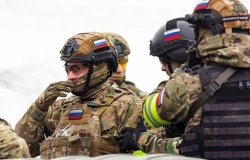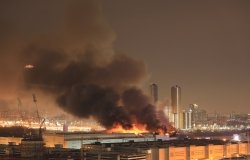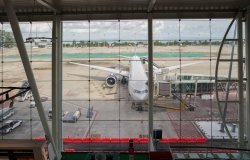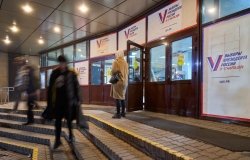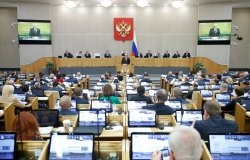
A blog of the Kennan Institute
Back to the Future: Russia’s New (and Old) Economic Policy
Vladimir Putin is putting a brave face on Russia’s downward economic spiral. To survive, he has gone back to core economic principles. Unfortunately, most of them date back to the Soviet Union and entail nationalization, which future leaders will find difficult to unwind.
Putin’s Perspective on the Role of the State
Russia’s economic turnaround depends in large part on a series of large national projects centered on technology, the family, young people, transportation, business development, and the creation of a new cadre of workers.
All this was outlined in Putin’s annual state-of-the-nation address, delivered on February 29. The cost is estimated at 17 trillion rubles, with all financing coming from the Russian state. One is reminded of the Five-Year Plans of yesteryear, except that the time frame for Putin’s national projects is six years. So we will have to wait until 2026 to find out what actually was achieved.
So central planning is back in business in the Russian Federation. But not to worry: the rest of the country is primed for new investment. Prime Minister Mikhail Mishustin wants to increase the number of economic zones in Russia, which will receive various tax breaks and other incentives to spur regional investment.
But where will the investment come from? Energy revenues are down significantly, thanks to sanctions, and Ukraine’s successful drone attacks on Russian energy terminals has led to a reduction of exports by 40 percent. Bankruptcies are up. Russia’s gasoline exports have also been suspended for six months to satisfy domestic demand. And one can forget about foreign investment. Putin has nationalized several foreign companies and given them to his cronies. My favorite “lucky” recipient is head of the Chechen Republic Ramzan Kadyrov’s thirty-two-year-old nephew, who just became the head of Danone’s Russian operations. The Russian government actually forced the sale, at a substantial discount. No wonder Russian business is worried about the future consequences of deprivatization, which will take years (if ever) to unwind and overcome.
Nevertheless, Putin remains optimistic. He wants to lower the level of poverty by 7 percent by 2030. He has further guaranteed that Russia will become the fourth largest economy in the world. Not to be outdone, the Speaker of the State Duma, Vyacheslav Volodin, insists that despite sanctions, Russia remains one of the main economies in Europe.
Magical Economic Thinking Meets Reality
The year of magical economic thinking continues as well. Russia has dredged up some statistics that don’t past the laugh test. For example, the Central Bank proclaimed that the Russian business climate grew to its maximum level for the last twelve years. Putin also touts that the BRICS have a larger portion of the global economy than the G7 countries. Alas, Putin was not able to attend the annual meeting in Johannesburg. His indictment by the International Criminal Court (the ICC) on child abduction meant that South African authorities would have to arrest him if he entered the country.
Meanwhile, Russia claims that it has dramatically narrowed its budget deficit, but more government spending lies just around the corner. According to Prime Minister Mikhail Mishustin, the government plans to write off two-thirds of the debts of Russia’s regions, to the tune of 1 trillion rubles. But not to worry: Putin has announced that he will reduce imports to the levels of the Soviet Union (a dubious benchmark) to support local business.
The only person who evidently understands the state of the economy is the head of the Russian Central Bank, Elvira Nabiullina. She has made dealing with inflation her primary goal, but to reach this goal, interest rates remain at a whopping 16 percent. She has further noted that if she were to change this policy, the real income growth for Russians would suffer significantly.
All of these economic costs are only exacerbated by the ongoing war in Ukraine. Equipment losses have been staggering, with major losses of tanks, ships, and infrastructure. The irony is that Russia placed great emphasis on being a naval power, especially in the Black Sea. Russia reportedly has lost between twenty-five and thirty warships, although Putin just announced a plan to rebuild the Russian fleet without foreign technology. And finally, no national project on the family will be able to replace the reported 300,000-plus losses that Russia has incurred on the battlefield, which will simply add more years to its long demographic crisis.
All of these losses have a knock-on effect on Russia’s soft power, especially in its former back yard. Russia recently complained that Kazakhstan has not done enough to alleviate the massive flooding in the bordering Orenburg region, with no subsequent reply. Kazakhstan reportedly is considering rendering military aid to Ukraine. But in the ultimate snub of Russia’s (and the Soviet Union’s) most sacred holiday, Astana announced that it will not observe the May 9Victory in Europe Day for the third straight year.
Despite these setbacks, Putin continues to contemplate grand projects without considering the cost. For example, Putin has once again proposed building a bridge that would connect the Russian mainland to Sakhalin for an estimated 600 billion rubles ($6.4 billion). Russia has also decided to go it alone to address shortages of pharmaceuticals and other essential products. In turn, Russia, the great energy power, has now prohibited exports of gasoline for six months to address domestic needs.
Finally, there is the question of all that cash frozen in European and American banks, estimated to value some $300 billion and more. Both the EU and the United States are eyeing these funds for reparations and rebuilding Ukraine. The bottom line is that this money is not returning to Russia anytime soon.
Putin keeps blaming everyone but himself for Russia’s economic problems. Putin further regularly asserts that he wants to advance Russia’s technological development, but how can this happen when Russian scientist keep getting arrested on spurious charges of treason?
In lieu of a prediction, I will close on the immortal words of the Nobel Prize–winning economist Herbert Stein: If something cannot go on forever, it will stop.
The opinions expressed in this article are those solely of the author and do not reflect the views of the Kennan Institute.
See our newest content first.
Subscribe to receive the latest analysis from the Russia File
About the Author

William E. Pomeranz
William Pomeranz, the Director of the Wilson Center’s Kennan Institute, is an expert guide to the complexities of political and economic developments in Russia, particularly through the lens of law. He leverages extensive, hands-on experience in international and Russian jurisprudence to address a wide range of legal issues, from the development of Russia’s Constitution to human rights law to foreign investment and sanctions. He is also the author of Law and the Russian State: Russia's Legal Evolution from Peter the Great to Vladimir Putin (Bloomsbury, 2018).
Read More
Kennan Institute
The Kennan Institute is the premier US center for advanced research on Russia and Eurasia and the oldest and largest regional program at the Woodrow Wilson International Center for Scholars. The Kennan Institute is committed to improving American understanding of Russia, Ukraine, Central Asia, the Caucasus, and the surrounding region though research and exchange. Read more

